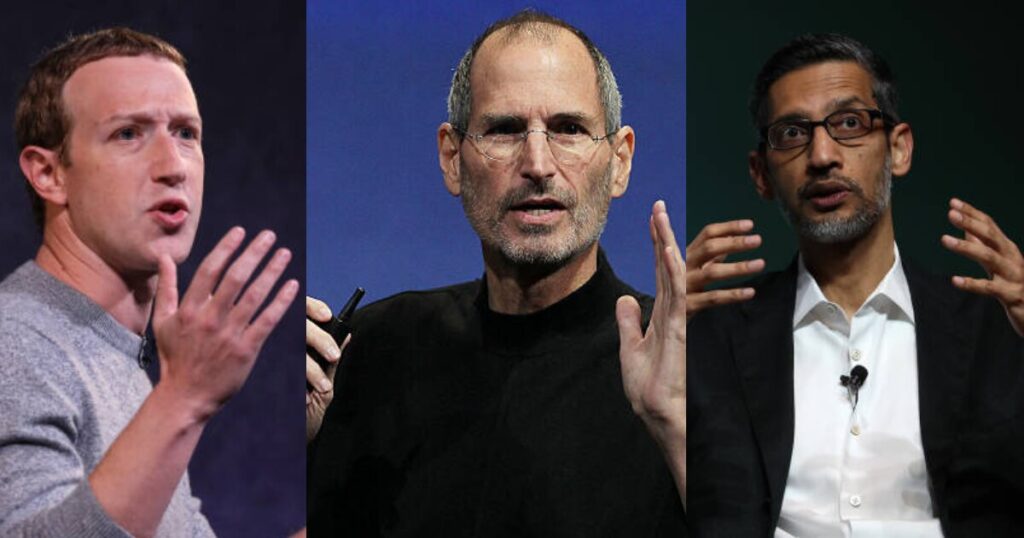Challenging Times for the Tech Industry in 2025: Although it’s only May, 2025 is already proving to be one of the toughest years yet for the tech giants. Once insulated by their immense size, financial strength, and global influence, companies like Meta, Apple, and Google are now facing intense legal scrutiny.
Their long-established practices are being examined, criticized, and in some instances, ruled unlawful. Regulators have moved beyond caution they’re directly confronting the core operations of Silicon Valley’s biggest players.

This growing pressure on Big Tech didn’t happen overnight. Governments have spent years attempting to hold these corporations accountable, often with minimal impact. But something has clearly changed this year. In the United States, three trillion-dollar companies are now embroiled in high-profile antitrust lawsuits that could not only alter their business models but also reshape how billions of users interact with their digital services.
Meta Faces Scrutiny: The Future of Instagram and WhatsApp
Meta, led by Mark Zuckerberg, is currently at the center of one of the most critical antitrust cases of our time. The Federal Trade Commission (FTC) has accused the company now valued at $1.4 trillion of acquiring Instagram and WhatsApp as a means to eliminate competition and cement its dominance in the social networking space.
Mark Zuckerberg stated that acquiring Instagram and WhatsApp was intended to enhance the user experience and encourage innovation. However, this strategy is now facing intense examination. However, the FTC presented a 2012 internal email where Zuckerberg suggested buying Instagram to neutralize a competitor. Other internal conversations expressed concern about Facebook Camera’s underperformance.
The FTC is pushing for Meta to separate from both Instagram and WhatsApp. If this move goes forward, it wouldn’t just reduce Meta’s advertising income especially since Instagram is expected to generate over half of its U.S. ad revenue this year but it could also pave the way for similar reversals of past mergers throughout the tech sector.
Read More: Post-Spring Recap: Michigan Football’s Key Players and Progress
Challenging Times for the Tech Industry in 2025
Apple: A Battle Over Control
While Meta’s legal fight is about past mergers, Apple is under fire for how it controls its ecosystem. On April 29, a U.S. court ruled that Apple “willfully defied” a 2021 mandate requiring it to allow app developers to inform users about payment options outside of the App Store.
Instead of full compliance, Apple introduced a 27% fee on external transactions effectively a slightly lower version of its original commission. The company also used warning-laden screens to deter users from choosing alternative payment methods.
Judge Yvonne Gonzalez Rogers condemned Apple’s approach as intentional and profit-driven, citing internal emails in which CEO Tim Cook overrode executives recommending compliance. One Apple finance executive, Alex Roman, is now facing a criminal contempt investigation for allegedly misleading the court.
While Apple is preparing to challenge the ruling, it is currently following the court’s directive. It has updated App Store policies to allow external payment links and cannot take a cut from those transactions.
Google’s Monopoly Challenge: A Call for Breakup
Google is currently battling what may become one of the most significant antitrust cases in tech history. The company has been labeled a monopoly in search and digital advertising, and the Department of Justice (DoJ) is seeking drastic changes including the potential divestiture of its Chrome browser.
According to the DoJ, Google’s dominance stems not just from product quality but also from anti-competitive practices, such as multibillion-dollar deals with Apple and Samsung to remain the default search engine. These agreements created a “self-reinforcing cycle” of growth more users generate more data, improve search results, increase ad revenue, and fund more default placements.
In court, CEO Sundar Pichai argued that the government’s proposed remedies such as forcing Google to share search data with rivals could cripple the Chrome browser and undermine cybersecurity and innovation. However, the DoJ remains unconvinced and seeks structural changes, including banning default search agreements and opening Google’s data to competitors.
If approved, the case could lead to the first major tech breakup since Microsoft narrowly avoided a similar fate in the early 2000s.
A New Era of Accountability
The legal battles facing Meta, Apple, and Google mark more than just isolated incidents they reflect a broader shift in how regulators are tackling concentrated tech power. For years, these companies defended their dominance as a result of innovation and strategic advantage. As we move into 2025, long-standing assumptions about Meta’s dominance are being critically re-evaluated.
Whether it’s Meta acquiring potential rivals, Apple maintaining rigid control over its app ecosystem, or Google locking out competitors through strategic partnerships, the underlying issue in each case is the same: unchecked dominance.
While the final outcomes may take years to unfold, one thing is clear 2025 is shaping up to be the year Big Tech faces real consequences.
